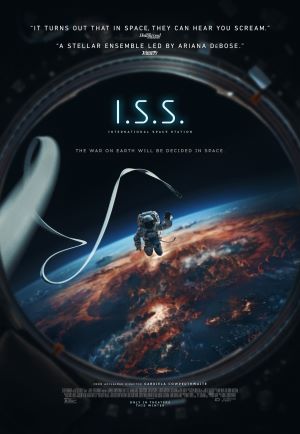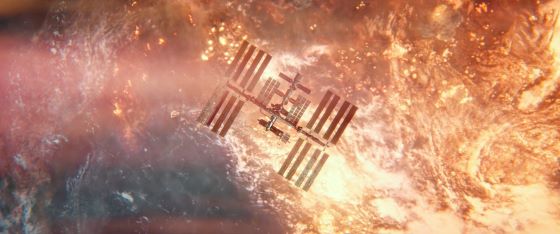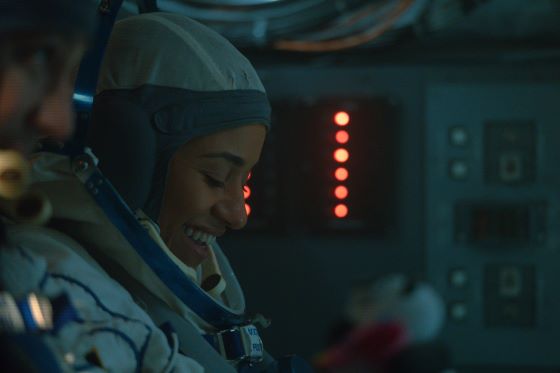

[Rating: Minor Rock Fist Down]
In theaters Friday, January 19
An intriguing set-up hampered by clunky writing and lethargic pacing, I.S.S. is a conflict movie in search of character. A competent and technically proficient “who can you trust?” thriller, the movie outruns its premise halfway through the second act, leaving more Chekov’s guns laying around than what might be considered advisable in a pressurized space station. Each of them fires with regrettable inevitability, and while there’s some decent action and a few nail-biting sequences, the biggest struggle I.S.S. confronts isn’t atmospheric gravity or betrayal, but boredom.
At a crisp 96 minutes, I.S.S. does have time on its side, which it doesn’t waste getting the audience introduced to its setting and characters. When astronauts Kira (Adriana DeBose) and Christian (John Gallagher Jr.) arrive at the International Space Station, they are greeted by fellow American, Gordon (Chris Messina), and the Russian crew: Weronika (Masha Mashkova), Alexey (Pilou Asbaek), and Nicholai (Costa Ronin). A belabored tour outlining all of the things that will become important in the back half of the picture follows (“This is our life support system. If you stop hearing it, you know we’re in trouble.”), which leads right into the central conflict of the picture.
And it’s a doozy! While looking down at Earth, Kira witnesses the horrifying sight of the continental United States erupting in apocalyptic fire and mushrooms clouds. More explosions follow elsewhere down below before the American crew gets one final order prior to the communications going out: take control of the station by any means necessary. This sets off a chain reaction of double and triple-crosses between the Americans and Russians, neither of whom trust the others (or even their own).

Fun as this is as an idea, neither the characters nor the action set-pieces develop in a way that allows the audience to identify with the people or the place. Although the script goes to great lengths to call out all of the parts of the station that will become important, like the life support system or lock boxes, no time is taken to establish the layout of the orbiting laboratory or how the characters function within it. This neuters the tension in scenes that see the astronauts spacewalk outside or sneak up on each other inside, both of which occur with little spatial context for the audience.
Likewise, the characters don’t have much time to develop traits or personalities that might inform the action or the audience’s buy-in for them. Kira and Gordon get the most in this regard during a well-written second act scene that sees both share some personal background info, yet I.S.S. could have used more of this. As it stands, the script sees the two sides go from drinking buddies to mortal enemies in the blink of an eye, which succeeds in getting the action going early, yet not with any consistency or quality that makes this trade-off worth it.
The effects team does a decent job selling the zero-g environment, though it’s not always seamless (the less said about the floating power drill fight the better). DeBose, fresh off of her Oscar win, isn’t snagging her second statue with this turn, though she and Messina do about as well as anyone could have with this script. The latter in particular accomplishes a lot with just a handful of scenes, and makes his presence felt throughout a movie that doesn’t see a lot of him in it.

And while director Gabriela Cowperthwaite seems comfortable staging the scenes and incorporating the visual effects into the practical sets, there’s an absence of kinetic momentum in all of this. Characters maneuver themselves into positions without establishing the stakes or consequences for the viewer, and plans are crafted without any real sense of the “or else” of anything. There’s a throwaway comment just before the midpoint about the station’s potential crash back to Earth if it falls out of orbit, but no clock is put on this development, and the action proceeds without much concern for it through most of I.S.S.
Granted, the surface-level conflict keeps the story moving along, yet there’s just not enough connective tissue between the concept and the action. As bad as a nuclear holocaust might look from space, one has to imagine the breakdown of basic human decency would go a little slower than the murderous speedrun on display, here. Not that there’s anything wrong with a brisk film getting straight to the goddamn point, but suspense needs a good set-up and time to marinate/develop flavor, and there’s just not a lot of room left for either in this one. Without the character work to establish the “why,” and the sense of place to orient the viewer as to the “where,” I.S.S. finds itself floating adrift.





Comments on this entry are closed.